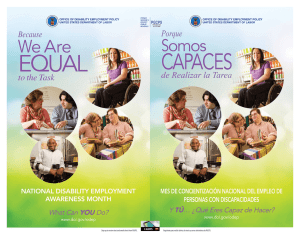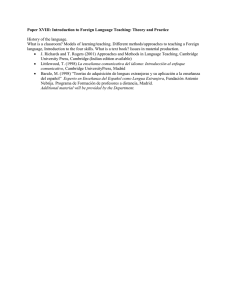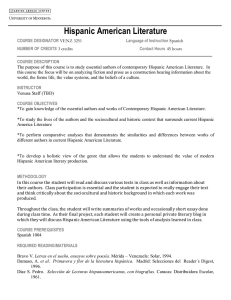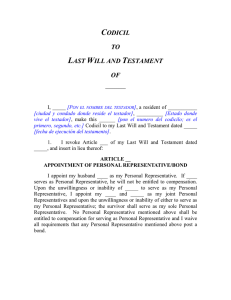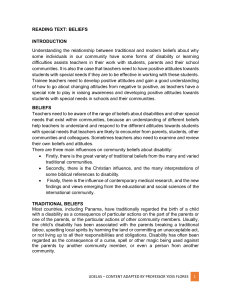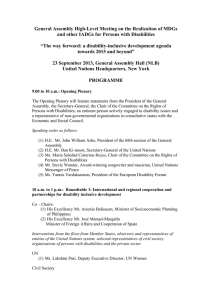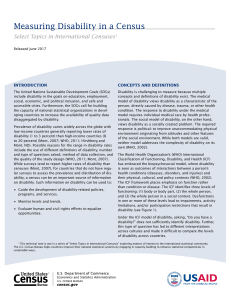In This Issue - Arizona Journal of Hispanic Cultural Studies
Anuncio
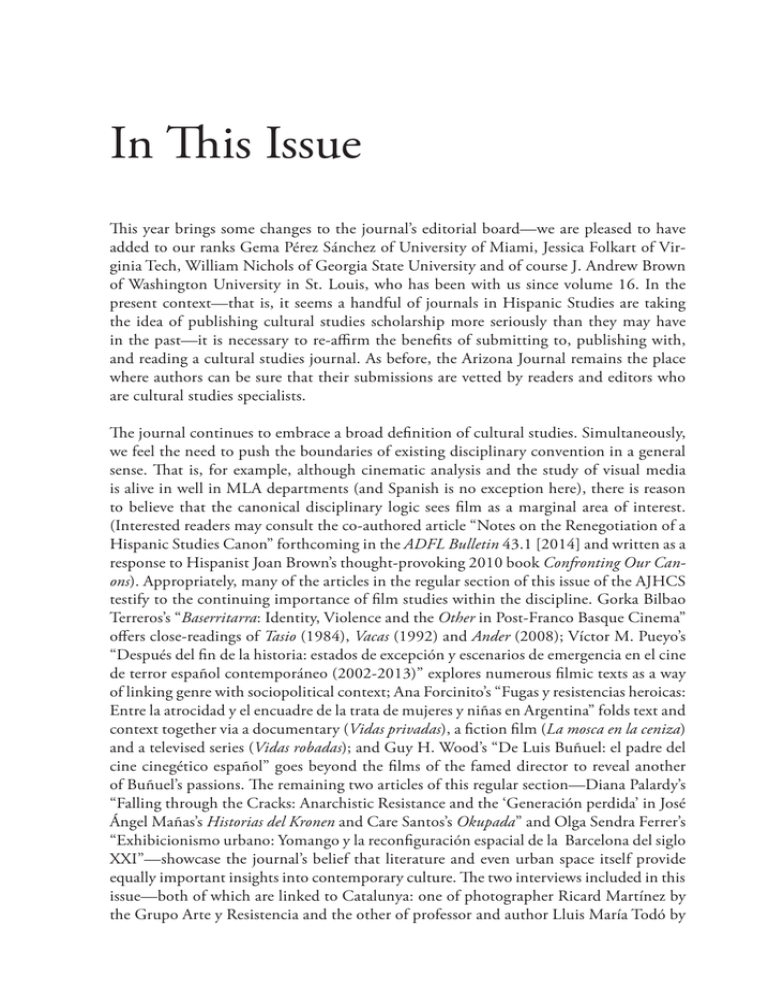
In This Issue This year brings some changes to the journal’s editorial board—we are pleased to have added to our ranks Gema Pérez Sánchez of University of Miami, Jessica Folkart of Virginia Tech, William Nichols of Georgia State University and of course J. Andrew Brown of Washington University in St. Louis, who has been with us since volume 16. In the present context—that is, it seems a handful of journals in Hispanic Studies are taking the idea of publishing cultural studies scholarship more seriously than they may have in the past—it is necessary to re-affirm the benefits of submitting to, publishing with, and reading a cultural studies journal. As before, the Arizona Journal remains the place where authors can be sure that their submissions are vetted by readers and editors who are cultural studies specialists. The journal continues to embrace a broad definition of cultural studies. Simultaneously, we feel the need to push the boundaries of existing disciplinary convention in a general sense. That is, for example, although cinematic analysis and the study of visual media is alive in well in MLA departments (and Spanish is no exception here), there is reason to believe that the canonical disciplinary logic sees film as a marginal area of interest. (Interested readers may consult the co-authored article “Notes on the Renegotiation of a Hispanic Studies Canon” forthcoming in the ADFL Bulletin 43.1 [2014] and written as a response to Hispanist Joan Brown’s thought-provoking 2010 book Confronting Our Canons). Appropriately, many of the articles in the regular section of this issue of the AJHCS testify to the continuing importance of film studies within the discipline. Gorka Bilbao Terreros’s “Baserritarra: Identity, Violence and the Other in Post-Franco Basque Cinema” offers close-readings of Tasio (1984), Vacas (1992) and Ander (2008); Víctor M. Pueyo’s “Después del fin de la historia: estados de excepción y escenarios de emergencia en el cine de terror español contemporáneo (2002-2013)” explores numerous filmic texts as a way of linking genre with sociopolitical context; Ana Forcinito’s “Fugas y resistencias heroicas: Entre la atrocidad y el encuadre de la trata de mujeres y niñas en Argentina” folds text and context together via a documentary (Vidas privadas), a fiction film (La mosca en la ceniza) and a televised series (Vidas robadas); and Guy H. Wood’s “De Luis Buñuel: el padre del cine cinegético español” goes beyond the films of the famed director to reveal another of Buñuel’s passions. The remaining two articles of this regular section—Diana Palardy’s “Falling through the Cracks: Anarchistic Resistance and the ‘Generación perdida’ in José Ángel Mañas’s Historias del Kronen and Care Santos’s Okupada” and Olga Sendra Ferrer’s “Exhibicionismo urbano: Yomango y la reconfiguración espacial de la Barcelona del siglo XXI”—showcase the journal’s belief that literature and even urban space itself provide equally important insights into contemporary culture. The two interviews included in this issue—both of which are linked to Catalunya: one of photographer Ricard Martínez by the Grupo Arte y Resistencia and the other of professor and author Lluis María Todó by Heather Jerónimo—take on the urban practice of refotografía in the first case and questions of urban activism, translation, sexuality and gay identity in the second. Pedagogical Perspectives pieces and interviews such as these continue to be a vital component of our publishing agenda. A note on this issue’s special section: “Disability Studies in the Hispanic World” is, simply put, the very first in the discipline to focus on disability. As is evident from the introductory remarks made by the section’s guest editor, Encarnación Juárez-Almendros, the authors of the articles in this section are pioneers in the field of Hispanic Disability Studies. It might be emphasized that, outside of our discipline, Disability Studies continues to flourish in general. The field—whose most noted practitioners include researchers not affiliated with Spanish Departments, for example, Sharon L. Snyder, David T. Mitchell, Lenard J. Davis, Michael Bérubé, Robert McRuer and Brenda Jo Brueggemann—now boasts a growing number of University Press book series and journals (among these are the Journal of Literary and Cultural Disability Studies, Disability Studies Quarterly, Canadian Review of Disability Studies, and The Review of Disability Studies). What is so compelling about this special section is the full range of historical periods, cultural contexts and textual approaches employed by the authors—as a whole, it is certain to engage those who may already be interested in issues of corporeality, more broadly understood. As always, we invite you to collaborate with us: as we redefine the online space of the journal and as we continue to push existing boundaries. As this movement unfolds, please take the opportunity to write an email to us and let us know what you would like to see in the journal, in our accompanying online site, in the discipline of Hispanic Studies, and in MLA fields and humanities scholarship more generally. Benjamin Fraser Managing Editor College of Charleston ([email protected])

